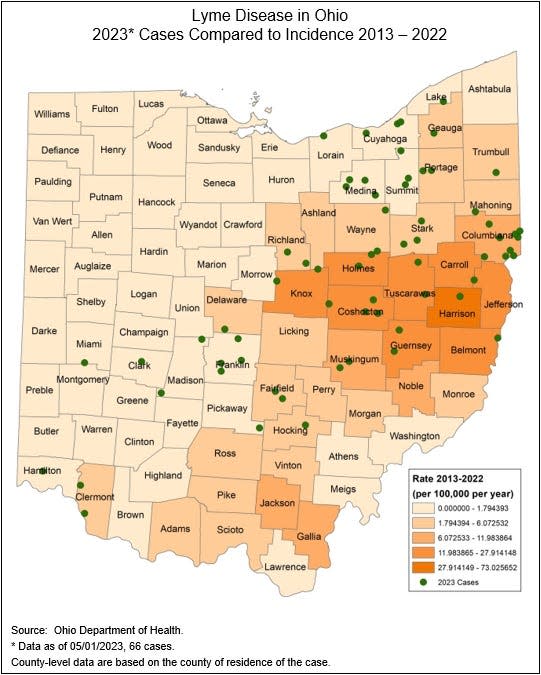Lyme disease cases on the rise in Tuscarawas County

DOVER ‒ The Tuscarawas County Health Department has seen a 25% increase in Lyme disease cases from April through the end of May.
During those two months, there were 10 suspected Lyme disease cases among Tuscarawas County residents, compared to eight suspected cases during the same time period in 2022.
Looking for ticks: Pesky prey: New Philadelphia students collect ticks for school project
In addition, the health department staff is already investigating another 15 suspected cases so far in June.
“We have seen a steady increase in reported Lyme disease case rates in Tuscarawas County over the past two to three years,” said Amy Kaser, director of nursing at the health department. “We also know that Lyme disease cases are even higher due to under reporting, and we encourage county residents to take precautions to prevent Lyme disease and to seek treatment early if symptoms arise.”
Cases of Lyme disease in Tuscarawas County dogs are slightly higher for 2023 with 363 cases (12.26% or about one in eight dogs tested for Lyme disease) as of June 8, according to the Companion Animal Parasite Council. For all of 2022, Tuscarawas County recorded a total of 618 positive cases (11.33% of dogs tested) of Lyme disease in dogs.
Tickborne diseases, like Lyme disease, are illnesses that can spread to people or pets through the bite of an infected tick. The longer the tick is attached to the person or animal, the greater the chance it will pass on any disease germs it may have. In general, it takes approximately 36 to 48 hours before the tick can transmit Lyme disease bacteria.
Symptoms of Lyme disease
Ticks can attach to any part of the human body but prefer hard-to-see areas such as the groin, armpits and scalp. Symptoms of Lyme disease may include a characteristic skin rash, called erythema migrans (a reddish-purplish rash that may also represent a bullseye), fatigue, chills, fever, headache, muscle and joint pain and/or swollen lymph nodes.
Late-stage Lyme disease can produce symptoms such as severe headaches and neck stiffness, arthritis with severe joint pain and swelling, irregular heartbeat and inflammation of the brain or spinal cord.
“It is very important to see your health care provider immediately if you notice any of the above symptoms and receive the appropriate treatment,” Kaser said.
For more information regarding Lyme disease and tick safety recommendations, visit www.tchdnow.org/ticks or make an appointment with your medical provider. If you do not have a medical provider, the health department welcomes new patients, and appointments can be made by calling 330-343-5555, ext. 1740, or ext. 1810.
This article originally appeared on The Times-Reporter: Lyme disease cases increasing in Tuscarawas County
